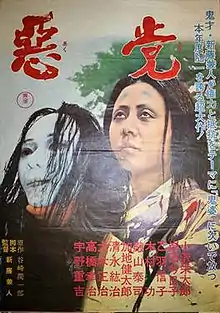Akuto
Akuto (悪党, Akutō, lit. "Villain"[lower-alpha 1]), U.S. title Conquest,[4] is a 1965 Japanese jidaigeki and drama film written and directed by Kaneto Shindō.[1][2] It is based on the play Kaoyo by Jun'ichirō Tanizaki.[5]
| Akutō | |
|---|---|
 Original Japanese film poster | |
| Directed by | Kaneto Shindō |
| Written by |
|
| Produced by |
|
| Starring | |
| Cinematography | Kiyomi Kuroda |
| Edited by | Toshio Enoki |
| Music by | Hikaru Hayashi |
Production companies |
|
| Distributed by | Toho |
Release date | |
Running time | 119 minutes |
| Country | Japan |
| Language | Japanese |
Plot
In the 14th century, Kō no Moronao, a deputy of the Ashikaga shogunate, hears of the beauty of Kaoyo, the wife of samurai Takasada of the Shioji clan. Obsessed with the thought of sleeping with Kaoyo, he instructs his chief chambermaid Jiju to arrange for a tête-à-tête. Jiju has letters in Moronao's name sent to Kaoyo, which first remain unanswered. Afraid to lose her position, Jiju sneaks into Takasada's house and tries to talk Kaoyo into giving in to the deputy's courting. Jiju is caught, confronted with Takasada's and Kaoyo's unconditional love and loyalty for each other. Moronao, furious about the woman's repeated resistance, orders Takasada to join the battles between the Northern and Southern dynasties to have him out of the way. The disobedient Takasada and his followers desert to meet with his wife at a secret place, where he is surrounded by Moronao's men. Takasada and his followers die in the subsequent battle, and Kaoyo has herself killed by family member Munemura. The victorious warriors and Jiju return to Moronao's estate, presenting him Kaoyo's severed head. Moronao is furious because he wanted her alive, not dead. Jiju starts laughing, and the severed head smiles.
Cast
- Nobuko Otowa as Jiju
- Kyōko Kishida as Kaoyo
- Eitaro Ozawa as Kō no Moronao
- Isao Kimura as Enya Takasada
- Kentaro Kaji as Rokuro
- Taiji Tonoyama as Munemura
- Jūkichi Uno as Yoshida Kenko, the poet
Notes
- Akutō can refer to a villain in general, or to someone who opposed the shogunate during the Kamakura and Muromachi period.[3]
References
- "悪党 (Akutō)". Kinenote (in Japanese). Retrieved 31 July 2021.
- "悪党 (Akutō)". Japanese Movie Database (in Japanese). Retrieved 31 July 2021.
- "悪党 (Akutō)". Kotobank (in Japanese). Retrieved 31 July 2021.
- Galbraith IV, Stuart (2008). The Toho Studios Story: A History and Complete Filmography. Scarecrow Press. ISBN 978-1461673743.
- Richie, Donald (1998). "The Film Adaptations". In Boscaro, Adriana; Chambers, Anthony (eds.). A Tanizaki Feast: The International Symposium in Venice. Ann Arbor: University of Michigan Center for Japanese Studies. p. 168.